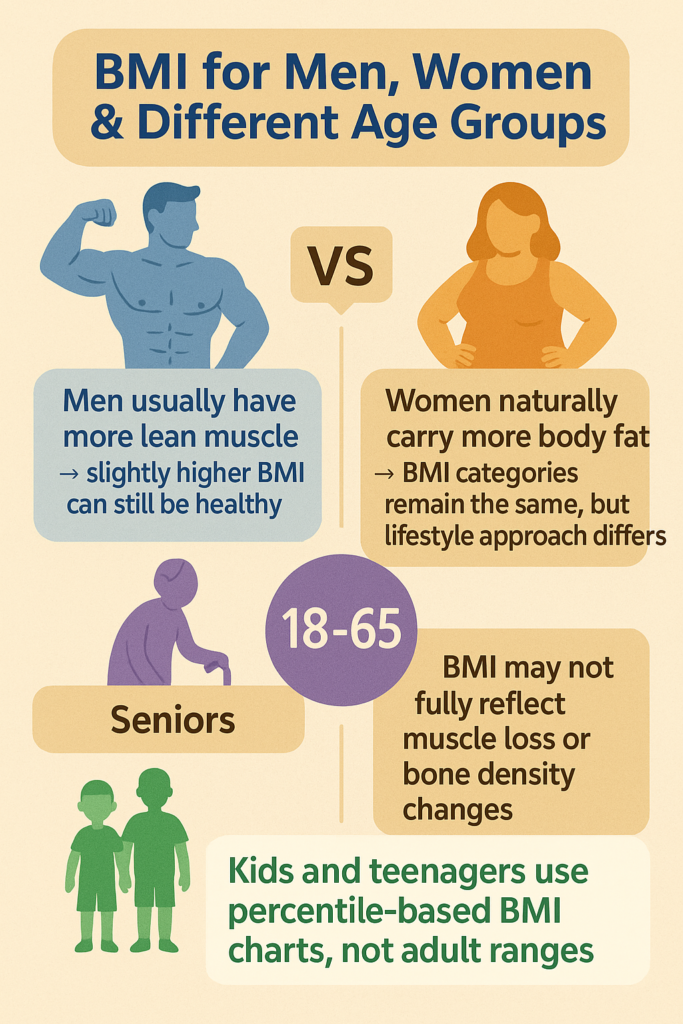Your Body Mass Index (BMI) is a simple calculation that helps you understand whether your weight is in a healthy range for your height. It’s one of the most widely used indicators for general health, fitness progress, and even sports performance.
Whether you’re an athlete, someone trying to get fitter, or just checking your health, knowing your BMI gives you a quick snapshot of where you stand — underweight, healthy weight, overweight, or obese.
A balanced BMI can help improve stamina, reduce fatigue, prevent injuries, and support better performance in any sport you play.
Use the Free BMI Calculator Below
Enter your height and weight to calculate your BMI instantly.

What Your BMI Result Means
BMI is simply a number — but understanding what that number means is important.
Here’s how BMI is classified:
| BMI Category | Range (kg/m²) | Meaning & Health Impact |
|---|---|---|
| Underweight | Less than 18.5 | Lower energy levels, reduced muscle mass, higher injury risk. |
| Healthy Weight | 18.5 – 24.9 | Best range for overall health, stamina, and daily performance. |
| Overweight | 25 – 29.9 | Higher stress on joints, may impact agility and endurance. |
| Obesity (Class I) | 30 – 34.9 | Increased risk of fatigue, lower mobility, higher injury risk. |
| Obesity (Class II) | 35 – 39.9 | Significantly reduced endurance; requires lifestyle adjustments. |
| Severe Obesity (Class III) | 40+ | Very high health risk — medical guidance recommended. |
How BMI Is Calculated (Metric & Imperial Examples)
BMI uses height and weight to estimate body fat levels.
Metric Formula
BMI = Weight (kg) ÷ Height² (m²)
Example:
- Weight: 70 kg
- Height: 1.75 m BMI = 70 ÷ (1.75 × 1.75) = 22.86 (Healthy range)
Imperial Formula
BMI = 703 × weight (lbs) ÷ height² (in²)
Example:
- Weight: 165 lbs
- Height: 68 in BMI = 703 × 165 ÷ (68 × 68) = 25.1 (Overweight category)
BMI Chart for Adults (Men & Women)
A BMI chart helps you quickly understand where you fall without doing calculations.
| BMI | Weight Category |
|---|---|
| Below 18.5 | Underweight |
| 18.5 – 24.9 | Healthy Weight |
| 25 – 29.9 | Overweight |
| 30 – 34.9 | Obesity (Class I) |
| 35 – 39.9 | Obesity (Class II) |
| 40+ | Severe Obesity |
BMI for Athletes vs. General Users
Athletes often have higher muscle mass, which can increase BMI even if body fat is low.
If you are an athlete:
- BMI may underestimate your fitness level
- Muscle weighs more than fat
- Consider checking: body fat %, muscle mass, waist size
If you are a non-athlete:
BMI usually gives a good overview of your healthy weight range.
BMI for Men, Women & Different Age Groups

Men vs Women
- Men usually have more lean muscle → slightly higher BMI can still be healthy
- Women naturally carry more body fat → BMI categories remain the same, but lifestyle approach differs
Adults 18–65
Regular BMI interpretation applies.
Seniors
BMI may not fully reflect muscle loss or bone density changes.
Children & Teens
Kids and teenagers use percentile-based BMI charts, not adult ranges.
Why BMI Matters for Health & Sports Performance
Understanding your BMI can help you:
- Track ideal weight for your sport or fitness level
- Prevent fatigue, muscle strain, and joint injuries
- Plan workouts and nutrition more effectively
- Improve speed, stamina, and agility
- Maintain long-term heart and metabolic health
Even a small improvement in BMI can boost overall performance.
Tips to Improve Your BMI (Simple and Practical)
If You Are Underweight
- Add calorie-dense healthy foods (nuts, avocados, whole grains)
- Include strength training to build muscle
- Increase protein intake
If You Are Overweight
- Combine light cardio + resistance training
- Reduce sugary drinks and processed foods
- Improve hydration and sleep routine
If You Are Obese
- Start low-impact exercises: walking, cycling, swimming
- Aim for gradual weight loss
- Consider speaking with a dietician or doctor
BMI Limitations You Should Know
BMI is a helpful screening tool, but not a perfect one.
It does not measure:
- Muscle mass
- Body fat %
- Bone density
- Waist-to-hip ratio
- Fitness level
This is why athletes, bodybuilders, and seniors may need additional assessments.
Related Health & Fitness Tools
Another helpful health tool to guide your wellness journey, ensuring you never miss anything important.
- Body Fat % Calculator
- BMR Calculator
- Daily Calorie Needs Calculator
- Ideal Weight Calculator
- Waist-to-Hip Ratio Calculator
These help users explore more health insights
Frequently Asked Questions (FAQs)
A BMI between 18.5 and 24.9 is considered healthy for adults.
Not always — athletes may have higher BMI due to muscle weight.
Yes, especially for muscular individuals, seniors, and children.
Regular exercise, balanced diet, portion control, sleep, and hydration.
The classification is the same, but muscle distribution differs.
